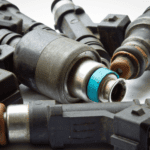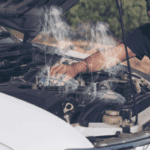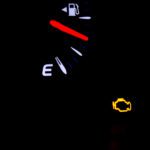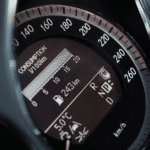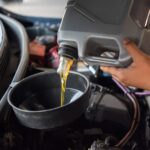Engines consume a small amount of oil; it’s supposed to happen! But some cars burn oil way too fast; the first thing to answer is, what is too fast? A cup a week, a quart a month?
If you notice that you’re adding oil to your engine every week, it’s important to identify the cause. Simply topping up the oil without addressing the underlying issue can lead to further problems. While a leak is a common reason for losing oil, it’s not the only one. In fact, several other issues can cause excessive oil consumption in a car. This article will explore the seven most common issues that I typically find when inspecting a vehicle for this problem.
What Does It Mean if Your Car Is Using Oil?
If your car is consuming oil, there are two possible reasons: your vehicle is leaking oil, or the engine is burning oil. An oil leak is easier to identify than determining why an engine burns oil. The latter case can have multiple reasons, but the core issue is that engine oil enters the combustion chamber (cylinder), which is combusted alongside fuel. Either way, an engine should not consume large amounts of oil. Naturally, an engine will use a small amount over time.
7 Reasons Your Car Is Running Out of Oil Quickly
Some of the reasons below are very similar, for example, some of the different reasons for oil leaking, but I wanted to highlight them individually for the other symptoms you might also experience.
Incorrect Or Poor-quality Oil
To simply explain this, think of engine oil as blood in the human body; mixing two different blood groups in a person can cause a fatality. Engine oil is exactly the same; oil comes in a range of varying viscosity. Viscosity means how easily the oil flows at a specific temperature; some oils are thicker, and some are thinner.
Suppose your engine is designed to run on a thicker oil (higher viscosity), and you put a thinner oil in. In that case, the thinner oil (lower viscosity) will deteriorate quickly and burn away in the engine. This is because the lower-viscosity oil has a lower burning temperature. On the other hand, putting thicker oil in a lower viscosity oil engine has a similar issue; the oil can’t lubricate engine components correctly. This causes friction between moving engine components and increases the temperatures, resulting in the engine burning oil.
Unless you know the incorrect oil has been used, it may be impossible to identify if your engine has the right or wrong oil. But if you know you have the incorrect oil in your engine, perform an oil change, ensuring the correct oil is used. Using the wrong oil will rarely cause lasting damage if rectified reasonably quickly.
Worn Gaskets And Seals
Worn gaskets and seals can be a common issue in vehicles as they age. The gaskets and seals become brittle and crack, leading to oil leaks that can damage the engine if not replaced. The most common gaskets that leak aside from the head gasket and piston rings (I’ve covered these separately) are:
- Rocker cover gasket – The rocker cover is the lid on top of the engine. The gasket in question seals the rocker cover to the cylinder head. If this gasket fails, oil can leak out of the top of the engine. You can see the oil drip marks coming from the rocker cover when the engine runs.
- Sump gasket – The sump containing all the engine oil is sealed to the engine block by a gasket. A worn or damaged sump gasket or sump plug gasket commonly causes leaks from the sump.
- Oil filter seal – The rubber seal between the oil filter and the engine block can also leak if not correctly positioned on the oil filter (faulty oil filter), or it gets caught and tears when replacing the filter. When the oil filter is to blame, you can see the oil leaking at the base of the oil filter.
- Engine oil seal – also known as the crankshaft seal, is located at the front and rear of the engine and prevents oil from leaking out of the crankshaft. This seal can wear out over time, which will cause an oil leak. This is a rare place to see oil leaks, but one to be aware of.
- Turbo seals – The turbocharger relies on a series of seals to keep oil from leaking out or into the different sides of the turbo. If these seals become worn or damaged, oil can leak out of the turbo and onto other engine components. When an oil seal in a turbo fails, it can be a sign of another issue causing this failure, such as high oil pressure or running dangerously low on oil.
Worn Piston Rings
Each cylinder in the engine has a piston fitted inside. The pistons are surrounded by piston rings responsible for sealing the combustion chamber. The piston rings prevent any leaks of fuel, oil, oxygen, or exhaust gases during combustion. Apart from sealing, piston rings also help scrape off excess oil on the cylinder wall when the piston goes up.
However, with worn piston rings, the excess oil fails to get scraped off and burns during combustion, causing rapid oil consumption. Although a minimal amount of oil burning is expected, as some oil is left behind, a lot of oil consumption is a sign of worn piston rings.
A good indicator that your engine is burning oil due to worn piston rings is to look at the exhaust fumes; when oil is burning, you can expect to see excessive amounts of thick blue/grey exhaust gasses.
Replacing piston rings is a huge job that can often cost thousands; sometimes, you are better off replacing the whole engine or car, depending on the age and value. Either this is best left to the professionals to diagnose and replace.
Overfilled Engine Oil
Sounds silly. If you’re topping up your oil regularly, you would think it can’t be overfilled. But, if you aren’t 100% sure how to read the level on your dipstick or where the maximum marker is, it’s easy to keep your engine overfilled accidentally. Here’s the issue: an engine filled with too much oil has no choice but to force the excess oil into the engine cylinder, which is consumed during combustion.
This is difficult to diagnose because how can you tell yourself if you’re now questioning where the minimum and maximum markers on the dipstick are? Ask your mechanic to show you. Most mechanics are glad to help point you in the right direction. It makes life easier when they come around to service a vehicle that has been taken care of. Once the mechanic has shown you the markers, you will know whether you’re making a mistake.
On the other hand, consider that you may not be the one who added too much oil to your engine. I have personally encountered situations where other “mechanics” or “friends who claimed to know how to fix cars” have made this mistake. It’s pretty straightforward to put right, but it shouldn’t have happened in the first place.
Head Gasket Leaking
When a head gasket blows, it can cause various issues in a car’s engine. One of the most common problems is the mixing of oil and coolant. This happens because the head gasket is responsible for sealing the water jackets that allow coolant to pass through the engine. Once the head gasket is damaged, the coolant can leak into the oil passages and vice versa.
You might notice several symptoms if you’re experiencing a blown head gasket; aside from a high consumption rate of oil, they include:
- Overheating engine
- Excessive white smoke coming from the tailpipe.
- Low coolant level
- Low oil pressure
It’s important to be aware of these symptoms and to take your car to a mechanic as soon as possible if you suspect a blown head gasket. Ignoring the problem can lead to further engine damage and a complete write-off. The good news is that a skilled mechanic can often repair a blown head gasket, but it’s a costly repair.
Pcv Valve Issue
The Positive Crankcase Ventilation (PCV) system removes harmful gases from the crankcase and redirects them into the engine’s intake system. Its job is to regulate the gas flow and ensure the engine operates efficiently.
When the PCV valve is operating correctly, it is “normally open,” which means it allows excess gas to escape from the crankcase. If the PCV valve becomes stuck closed, it can cause the pressure inside the engine to build up to dangerous levels. This can force oil out of anywhere it can, such as seals, piston rings, gaskets, etc., leading to oil leaks and other problems. The excess pressure may also cause the oil to burn away due to the rising temperatures.
Fortunately, the PCV valve is a relatively inexpensive part to replace, and it is easy to access in most engines.
Oil Leak
As I’ve already pointed out, a leak is one of the most apparent reasons for constantly topping up oil. A leak can come from many places on an engine; some of them have already been covered, but here are some of the other common areas to look for evidence of a leak:
- Sump
- Sump plug
- Oil filter
- Oil cooler
- Oil pipes
- Oil temperature sensor
You often need to look at these components to determine if there’s an issue, a noticeable oil coating around one of them, and you’ve found your problem. Sometimes, hairline cracks in things like the engine sump are not evident to the eye, so you are looking for tiny traces of oil; wipe it away and see if more appears.
Most of these items are straightforward to replace; however, they may require completely draining the oil before you can remove and replace them.
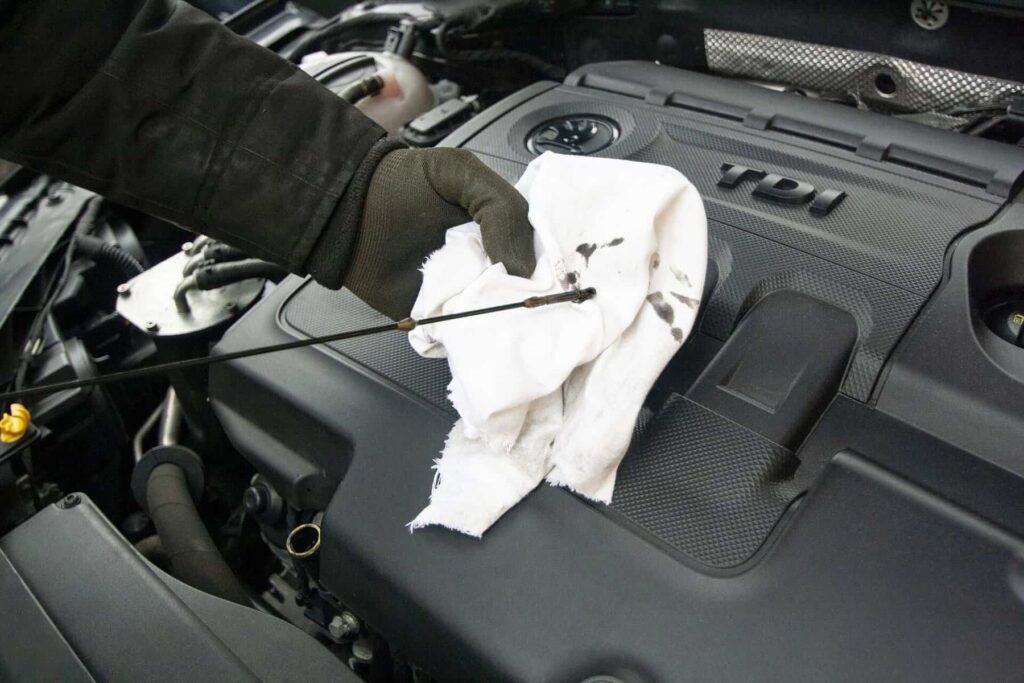
What Is The Normal Consumption Rate Of Oil For A Car Engine?
The amount of oil a car engine consumes can depend on the car’s make and model, engine age, service history, and driving conditions. However, as a general guideline, a car engine consuming around 1 quart of oil every 3,000-5,000 miles is normal.
Can You Continue to Drive a Car if It Is Running Out of Oil Fast?
I do not recommend driving a car if it is running out of oil fast. The oil in a car is essential for lubricating the engine’s moving parts and keeping it cool. If the oil level drops too low, the engine can overheat, which can cause severe damage. No matter how much you top up the oil, there is always the chance the leak or oil consumption will get bad very quickly, and this will always happen mid-journey.
What Happens if You Run out of Oil?
Running out of oil is bad; I’m sure you know that. Running out of oil completely will result in total engine failure – an expensive repair.
The job of engine oil is to keep the temperature down in the engine and lubricate moving components. When the engine components become dry, problems such as dry bearings in the bottom of the motor can cause a total engine seizure.
How Often Should You Top-up Your Engine Oil?
The engine oil level should be checked monthly or before a long journey. In mileage terms, it should be checked around every 1,000 miles. It may sound quite frequent, but it is a job that takes a couple of minutes at worst and will save you a lot of money and trouble in the long run.
Final Remarks
Engine oil should be burnt away in minimal amounts; this is normal. Because of this, you should check the oil monthly and top it up where needed. If you are topping up the oil more frequently, you have a problem that needs rectifying ASAP. This could be a leak or the engine burning oil during combustion, regardless of why; leaving the car leaking or burning oil can result in running with no oil, which will cause costly damage.
Many of the repairs for an engine consuming oil quickly are cheap, sometimes just as cheap as the oil needed to top it up again.


